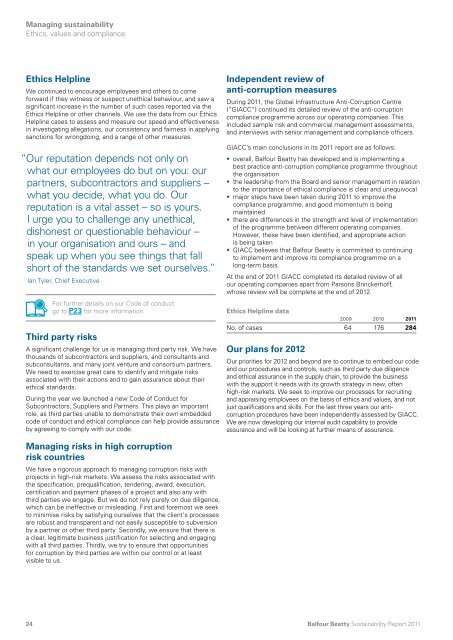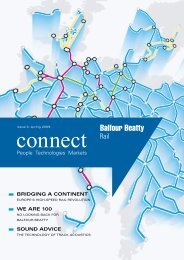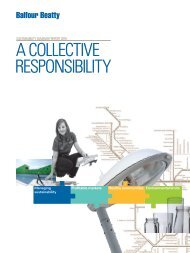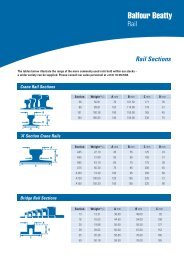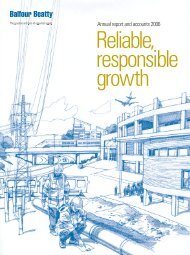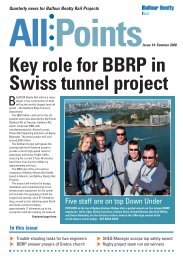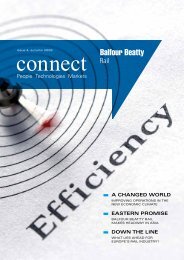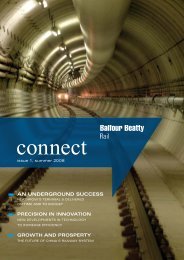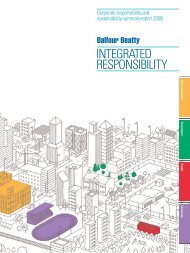Sustainability Report 2011 - Balfour Beatty Rail
Sustainability Report 2011 - Balfour Beatty Rail
Sustainability Report 2011 - Balfour Beatty Rail
You also want an ePaper? Increase the reach of your titles
YUMPU automatically turns print PDFs into web optimized ePapers that Google loves.
Managing sustainability<br />
Ethics, values and compliance<br />
Ethics Helpline<br />
We continued to encourage employees and others to come<br />
forward if they witness or suspect unethical behaviour, and saw a<br />
significant increase in the number of such cases reported via the<br />
Ethics Helpline or other channels. We use the data from our Ethics<br />
Helpline cases to assess and measure our speed and effectiveness<br />
in investigating allegations, our consistency and fairness in applying<br />
sanctions for wrongdoing, and a range of other measures.<br />
“Our reputation depends not only on<br />
what our employees do but on you: our<br />
partners, subcontractors and suppliers –<br />
what you decide, what you do. Our<br />
reputation is a vital asset – so is yours.<br />
I urge you to challenge any unethical,<br />
dishonest or questionable behaviour –<br />
in your organisation and ours – and<br />
speak up when you see things that fall<br />
short of the standards we set ourselves.”<br />
Ian Tyler, Chief Executive<br />
For further details on our Code of conduct<br />
go to P23 for more information<br />
Third party risks<br />
A significant challenge for us is managing third party risk. We have<br />
thousands of subcontractors and suppliers, and consultants and<br />
subconsultants, and many joint venture and consortium partners.<br />
We need to exercise great care to identify and mitigate risks<br />
associated with their actions and to gain assurance about their<br />
ethical standards.<br />
During the year we launched a new Code of Conduct for<br />
Subcontractors, Suppliers and Partners. This plays an important<br />
role, as third parties unable to demonstrate their own embedded<br />
code of conduct and ethical compliance can help provide assurance<br />
by agreeing to comply with our code.<br />
Managing risks in high corruption<br />
risk countries<br />
We have a rigorous approach to managing corruption risks with<br />
projects in high-risk markets. We assess the risks associated with<br />
the specification, prequalification, tendering, award, execution,<br />
certification and payment phases of a project and also any with<br />
third parties we engage. But we do not rely purely on due diligence,<br />
which can be ineffective or misleading. First and foremost we seek<br />
to minimise risks by satisfying ourselves that the client’s processes<br />
are robust and transparent and not easily susceptible to subversion<br />
by a partner or other third party. Secondly, we ensure that there is<br />
a clear, legitimate business justification for selecting and engaging<br />
with all third parties. Thirdly, we try to ensure that opportunities<br />
for corruption by third parties are within our control or at least<br />
visible to us.<br />
24<br />
Independent review of<br />
anti-corruption measures<br />
During <strong>2011</strong>, the Global Infrastructure Anti-Corruption Centre<br />
(“GIACC”) continued its detailed review of the anti-corruption<br />
compliance programme across our operating companies. This<br />
included sample risk and commercial management assessments,<br />
and interviews with senior management and compliance officers.<br />
GIACC’s main conclusions in its <strong>2011</strong> report are as follows:<br />
• overall, <strong>Balfour</strong> <strong>Beatty</strong> has developed and is implementing a<br />
best practice anti-corruption compliance programme throughout<br />
the organisation<br />
• the leadership from the Board and senior management in relation<br />
to the importance of ethical compliance is clear and unequivocal<br />
• major steps have been taken during <strong>2011</strong> to improve the<br />
compliance programme, and good momentum is being<br />
maintained<br />
• there are differences in the strength and level of implementation<br />
of the programme between different operating companies.<br />
However, these have been identified, and appropriate action<br />
is being taken<br />
• GIACC believes that <strong>Balfour</strong> <strong>Beatty</strong> is committed to continuing<br />
to implement and improve its compliance programme on a<br />
long-term basis.<br />
At the end of <strong>2011</strong> GIACC completed its detailed review of all<br />
our operating companies apart from Parsons Brinckerhoff,<br />
whose review will be complete at the end of 2012.<br />
Ethics Helpline data<br />
2009 2010 <strong>2011</strong><br />
No. of cases 64 176 284<br />
Our plans for 2012<br />
Our priorities for 2012 and beyond are to continue to embed our code<br />
and our procedures and controls, such as third party due diligence<br />
and ethical assurance in the supply chain, to provide the business<br />
with the support it needs with its growth strategy in new, often<br />
high-risk markets. We seek to improve our processes for recruiting<br />
and appraising employees on the basis of ethics and values, and not<br />
just qualifications and skills. For the last three years our anticorruption<br />
procedures have been independently assessed by GIACC.<br />
We are now developing our internal audit capability to provide<br />
assurance and will be looking at further means of assurance.<br />
<strong>Balfour</strong> <strong>Beatty</strong> <strong>Sustainability</strong> <strong>Report</strong> <strong>2011</strong>


